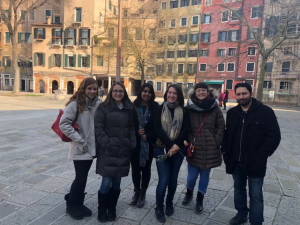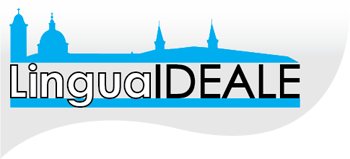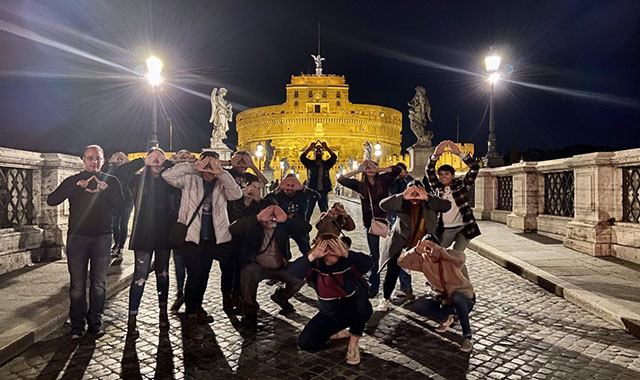The Art of Politics: Ideas, Institutions, and Culture
 Unlike many study abroad programs, which involve registrations at foreign institutions and administrative hurdles to transfer courses, the COLFA Semester in Urbino offers UTSA courses taught by UTSA faculty or by University of Urbino faculty who have been vetted and approved by UTSA. The courses have been carefully selected to fit into UTSA degree plans and will appear seamlessly in ASAP. Moreover, since you will remain a full-time UTSA student during your semester abroad you will have access to UTSA services such as financial aid and library resources and will not encounter difficulties with minimum credit-hour requirements for financial aid or scholarships.
Unlike many study abroad programs, which involve registrations at foreign institutions and administrative hurdles to transfer courses, the COLFA Semester in Urbino offers UTSA courses taught by UTSA faculty or by University of Urbino faculty who have been vetted and approved by UTSA. The courses have been carefully selected to fit into UTSA degree plans and will appear seamlessly in ASAP. Moreover, since you will remain a full-time UTSA student during your semester abroad you will have access to UTSA services such as financial aid and library resources and will not encounter difficulties with minimum credit-hour requirements for financial aid or scholarships.
Supplemental art and cooking classes are also available during the semester
Important Dates for Spring 2023
See some of the important events and trips scheduled for the semester. Many of the details are still being finalized, so some dates and trip destinations may vary. Consult the printable schedule for more details including class meeting times.
| August 27 | List of participating students finalized |
|---|---|
| September 20 | $1000 commitment fee due |
| October 20 | $1750 balance of first payment due (remaining payments will be invoiced in ASAP and due on January 15, February 15, and March 15) |
| January 28 | Arrival in Rome at Leonardo da Vinci International Airport (FCO) no later than 12:30 pm; charter bus to Urbino departs promptly from the airport at 2:30. Anticipated arrival in Urbino at 6:30 pm. |
| January 29 | 9:00 GEV Orientation Lunch at Mensa 3:00 Urbino tour |
| January 30 | Classes begin. Please consult the printable schedule for class times |
| February 2 | 9:00 Organic Farm Tour 1:00 Welcome Lunch |
| February 3 | 9:00 Urbino historic tour including oratorios and Rafaello's birth house 11:00 Ducal Palace tour |
| February 4 | Guided tour of Pesaro (public bus) including Rossini's birth house, Civic Museum, and historic fish market |
| February 9 | Day trip to Bologna |
| February 16-19 | Extended excursion to Rome |
| February 20 | No classes: optional extra day in Rome |
| February 23 | Day trip to Perugia |
| March 2 | Day trip to Assisi |
| March 9-12 | Extended excursion to Siena and Florence |
| March 13-19 | Urbino Spring Break |
| March 23 | Day trip to Ancona |
| March 30-April 2 | Extended excursion to Verona and Venice |
| April 3 | No classes: optional extra day in Venice |
| April 7-10 | Easter Break (no classes) |
| April 13 | Day trip to Ravenna |
| April 24 | Final Presentations |
| April 25 | Final Exams, Papers, & Projects; Studio cleaning & check out; Farewell Dinner |
| April 26 | Late-night dorm checkout for midnight bus to Rom |
| April 27 | Early-morning dorm checkout for 5 am bus to Rome. All students must depart from Italy on this day |
Course Information
The following 16 credit hours of courses are offered during the Spring 2023 semester.
The focus will be especially relevant to students in the Political Science, Global Affairs, Politics and Law, Geography, Environmental Sustainability, History, Anthropology, Medical Humanities, and Communication programs. Graduate versions of these courses are also available. If you are a graduate student interested in the COLFA Semester in Urbino, please contact us for more information.
| GLA/POL 3563 | Current Issues in Global Affairs |
|---|---|
| POL/GLA/GES 4853 | Democracies in Crisis |
| POL/GLA/GES 4853 | Migration, Architecture, and the Politics of Public Space |
| AHC 4333 | Medieval and Renaissance Art History |
| FL 1034 | Elementary Italian |
Course Descriptions
 GLA/POL 3563 Current Issues in Global Affairs. An examination of the issues that divide the people of the world. The structure of contemporary world problems will be studied and possible strategies for the reduction of international conflict will be assessed. Topics may include nuclear proliferation, world hunger, revolution and intervention, transnational enterprises, competing ideologies of international relations, and global ecology.
GLA/POL 3563 Current Issues in Global Affairs. An examination of the issues that divide the people of the world. The structure of contemporary world problems will be studied and possible strategies for the reduction of international conflict will be assessed. Topics may include nuclear proliferation, world hunger, revolution and intervention, transnational enterprises, competing ideologies of international relations, and global ecology.
POL/GLA/GES 4853 Study Abroad: Democracies in Crisis. This course is about exploring what makes democracy work, and about the increasing challenges democracy faces both in the United States and abroad. Democratic crises take many forms. The most obvious crises are cases of democratic breakdown—where democracy as a form of government ceases to exist. But understanding, or even identifying such cases is no straightforward business. The death of democracy may be swift and dramatic; it may be gradual and seemingly uneventful—even “lawful.” Democracy’s antagonists may be identifiable in their personas and methods, or they may be anonymous and pursue democracy’s death by a thousand cuts. Even subtler are crises that paralyze democracies, diminish their qualities, or threaten to upend the power structure within democracies without upending governing processes.
The first half of the course will be devoted to defining democracy and to understanding different components, or ingredients, that come together to shape democratic outcomes. This includes an exploration of the structural, cultural, and institutional factors that make democracy work. Italy in comparative historical perspective will serve as a key exemplar. The second half of the course will be devoted to exploring and understanding various democratic crises—some in the form of breakdown (Europe, Latin America), and others that constitute crises in terms of quality and hint at the possibility of breakdown—in the United States, Hungary, Poland, Brazil, and other contemporary cases.
POL/GLA/GES 4853 Study Abroad: Immigration, Architecture, and the Politics of Public Space. Who belongs? While American civics textbooks generally answer this question from an inclusive, liberal-democratic perspective, the realities of citizenship and belonging are far more complicated. This course will examine the intersection of national identities, political power and participation, contested geographies, and the design of public spaces. Shared and contrasting identities related to race, ethnicity, and citizenship will be explored as factors that shape not only public opinions and attitudes, but also the physical nature of built public (and increasingly private) spaces. Current immigration “crises” in the U.S. and Europe alongside contrasting public and governmental responses to immigration will be examined as key contemporary exemplars of identity-based contestation over citizenship, belonging, and public space. In the Italian context, we will explore 2000+ years of architecture and public spaces shaped by the Roman Empire, Vatican, the Dark Ages, the Renaissance, Fascism, and modern using a comparative historical perspective to better understand evolving political attitudes about public space—and who belongs.
AHC 4333 Medieval and Renaissance Art History. In this course we will investigate several aspects of Medieval and Renaissance Art that took place in Italy during the 13th-16th centuries. We will begin with a short examination of the transition from Greek-Roman Art to the Art of the Middle Ages and the transition from Medieval Art (with a focus on gothic or proto-Renaissance art) to Renaissance Art, in order to be able to make critical comparisons between artworks from different ages. We will focus on architecture, sculpture and painting with an emphasis on monuments and works of art which students will see during the semester.
FL 1034. Beginning Language Study Abroad. Opportunity to begin developing oral and written communication skills in the target language, along with enhanced comprehension skills in listening and reading. Linguistic and cultural immersion. May be repeated up to 8 semester credit hours in each language.
Spring 2023 Faculty
Walter Clark Wilson is an associate professor of political science at the University of Texas at San Antonio. He joined the faculty in 2008 after graduating with his Ph.D. in political science from the University of Oklahoma’s Carl Albert Congressional Research and Studies Center. He is a former American Political Science Association Congressional Fellow, and served as a staffer to former congressman Charles A. Gonzalez (D-TX). Dr. Wilson pursues research agendas that examine the representation of underrepresented groups, congressional elections, and the impact of media on political attitudes and behaviors. His latest work explores the declining representation of class interests as a product of globally transcendent neoliberal ideology and the implications of these trends for increasing nationalist, populist, and illiberal politics in democracies. His research appears in scholarly journals including Polity, Legislative Studies Quarterly, and Social Science Quarterly. Dr. Wilson is author of From Inclusion to Influence: Latino Representation in Congress and Latino Political Incorporation in America, published by the University of Michigan Press, and coeditor of the Roads to Congressseries published by Palgrave-MacMillan Publishers. He lives with his family in San Antonio, TX.
Dr. Boyka Stefanova is a Professor in the Department of Political Science and Geography at UTSA. She holds a Ph.D. in Political Science from the University of Delaware (2004). Dr. Stefanova teaches a number of courses with global content, preparing students for life in the “global village” and for meeting future challenges. She aspires to bring the educational environment closer to real-world experiences, events, and global political change. Dr. Stefanova’s areas of specialization are European Politics and democracy in Eastern Europe, especially political conflict, territoriality, and majority-minority relations. She has published four books in the area of comparative studies and issues in European integration. Her most recent book, The European Union and Europe’s New Regionalism: The Challenges of Enlargement, Neighborhood, and Globalization (Palgrave Macmillan, 2018) presents an analysis of the evolving nature of European regionalism in a global perspective. Dr. Stefanova is author of a variety of articles and book chapters in the areas of conflict resolution, minority rights, regionalism, and the geopolitics of energy. Her work has appeared in Ethnic and Racial Studies, Electoral Studies, Nationalities Papers, Journal of Strategic Security, East European Politics & Societies, World Affairs, and Cornell International Law Journal, among others. Dr. Stefanova participates in collaborative research projects and thematic studies involving scholars from a number of academic institutions and consortia in Europe. She has been a Fulbright Senior Scholar, Wilson Scholar, and grant recipient through the International Research and Exchanges Board (IREX).
Dr. Grazia Fachechi is an Assistant Professor of Art History at the University of Urbino, Department of Humanities, where she has taught undergraduate and graduate students for more than twenty years. She received her Bachelor and Master degrees in Urbino and did post-graduate work in other cities: Florence (certificate in Museology and Art Criticism at the International University of Art – UIA), Perugia (PhD in Art History at the University of Perugia) and Rome (Diploma of Specialization in Medieval and Modern Art History at Sapienza University). She currently lives in Rome.
Dr. Fachechi’s principal fields of expertise are illuminated manuscripts (specifically works preserved in the Vatican Library) and wooden sculptures. She is the author of a book on Jacopo da Fabriano who was one of the favorite miniaturists of the Renaissance Pope Pius II and two books on wooden sculptures. The most recent is a catalogue of the most important wooden sculpture collection in Italy (housed in the National Museum of Palazzo Venezia in Rome) and was funded by the Getty Foundation of Los Angeles.
She has also published research on paintings, both from the Medieval and Renaissance ages. She is very interested in the text-image relationship, both in the religious context, with special regard to the iconography of the Passion of Christ, and in the lay context, with particular interest in iconographical themes of Classical Antiquity and the visual illustration of ancient literary works (especially those by the Latin writers Plauto and Seneca) in the Medieval and Renaissance eras.
 The Italian language courses are taught by certified instructors at Lingua Ideale Urbino working under the auspices of the University of Urbino “Carlo Bo”. Lingua Ideale is a professional language school offering courses of Italian language and culture to foreigners. The curriculum for the COLFA Semester in Urbino has been designed to meet the requirements of the foreign language courses at UTSA while also incorporating local aspects of Italian culture.
The Italian language courses are taught by certified instructors at Lingua Ideale Urbino working under the auspices of the University of Urbino “Carlo Bo”. Lingua Ideale is a professional language school offering courses of Italian language and culture to foreigners. The curriculum for the COLFA Semester in Urbino has been designed to meet the requirements of the foreign language courses at UTSA while also incorporating local aspects of Italian culture.


